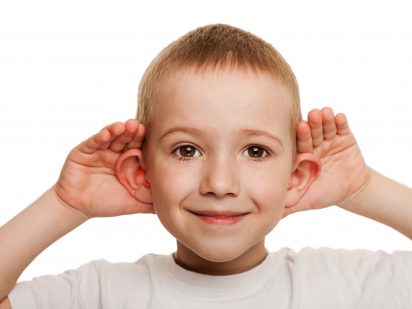It may seem like school just ended for the summer, but it is never too early to be prepared for the next school year.
In addition to the basics, such as school supplies or new clothes, a student’s health and well-being should also be taken into consideration. This includes standard hearing and vision checks and getting the proper vaccinations.
Hearing Checks
Hearing checks for children are important. According to the Centers for Disease Control and Prevention, 14.9 percent of children between the ages of 6 and 19 have low- or high-frequency hearing loss of at least 16-decibel hearing levels in one or both ears.
According to the American Speech-Language-Hearing Association (ASHA), hearing screenings during childhood are vital for early identification and management of hearing loss. Jerrica Maxson, AuD, an audiologist with Trinity Health Audiology, says that undetected or untreated hearing loss could have a great impact on a student’s education. “It’s harder to learn. It’s harder to access that education. If it continues in that fashion, it could put those kids with undetected hearing loss at a greater disadvantage.”
In addition to a newborn hearing screen, additional hearing screens are recommended during well child checks. The American Academy of Pediatrics and Joint Committee on Infant Hearing suggest that children should get their hearing checked at ages 4, 5, 6, 8, and 10, and then, due to an increased risk of hearing loss secondary to unprotected noise exposure, at ages 13 and 15. However, as hearing screening may not be performed in all school districts, parents are encouraged to consider having hearing checks prior to the start of the new school year.
“We assess the health of the ear canal and ear drum, visually,” Maxson says. “Then we assess the child’s ability to detect soft sounds at the pitches that are important for understanding speech.”
Through this testing, the audiologists at Trinity Health incorporate age-appropriate games, which helps keep their attention longer. “Depending on their age, we test them differently,” Maxson says.
The appointment takes a half hour, with the first five minutes spent obtaining a hearing medical history of the patient, followed by 15 minutes of the actual testing. The remainder is used to counsel the patient on the results.
As reported by ASHA, it is well recognized that hearing is critical to speech and language development, communication, and learning. They add that children with listening difficulties due to a hearing loss or auditory processing problems continue to be at risk for developmental delays.
The behavioral effects of hearing loss can be like those of children with attention deficit disorders, learning disabilities, language problems, or cognitive delay, Maxson says. Some common behaviors include:
• Difficulty attending to spoken language
• Frequently asking for repetition
• Fatigue when listening
• Inappropriate (wrong) answers to simple questions
• Isolation from peers
• Reading difficulty
• Easily frustrated
Trinity Health Audiology includes Kelsey Artz, AuD, Jerrica Maxson, AuD, and Tricia Nechodom, AuD. Their office is located in the Medical Office Building, 2305 37th Ave SW, Minot. Depending on insurance, a referral may be needed to see an audiologist. For more information, call 701-418-7530.

